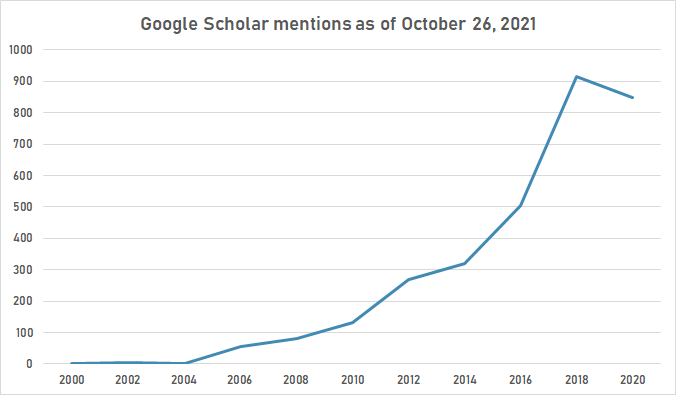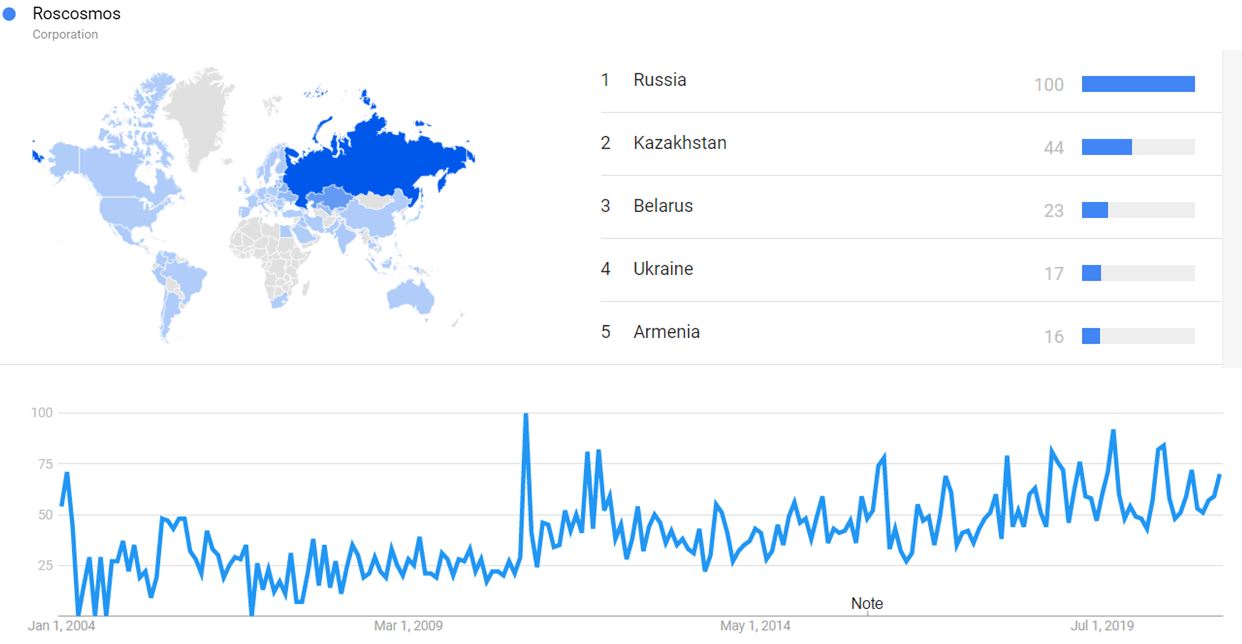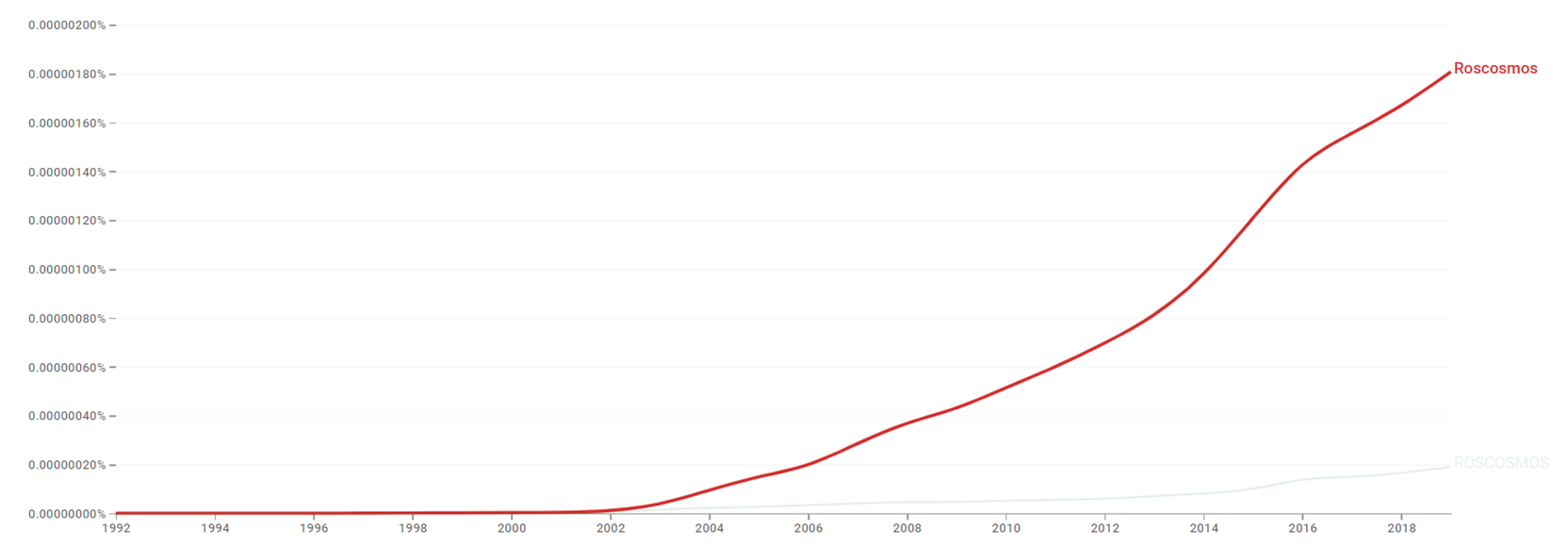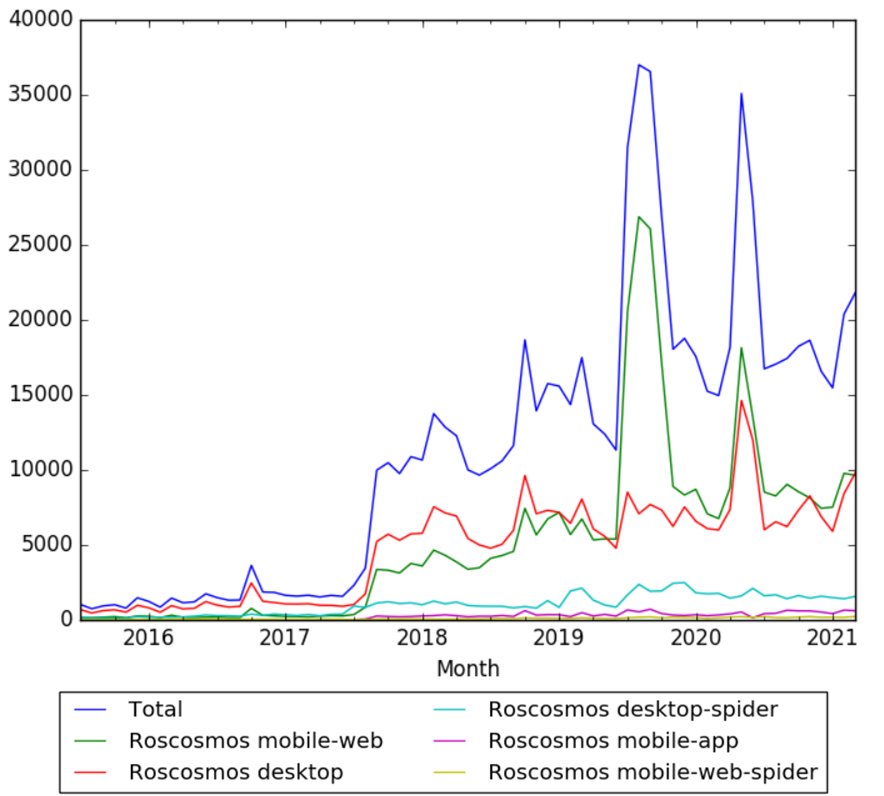Timeline of Roscosmos
This is a timeline of Roscosmos, the governmental body responsible for the space science program of the Russian Federation and general aerospace research. In addition to launching satellites for other countries, Roscosmos does numerous satellite missions of its own, like Earth observation, military satellites, telecommunications, and GLONASS navigation satellites.[1] Roscosmos' major space missions include Koronas Foton, Spektr R, Spektr RG, Bion-M and Elektro L. Roscosmos is one of the partners in the International Space Station.[2]
Big picture
| Time period | Development summary |
|---|---|
| 1991–2006 | Crisis years. With the collapse of the Soviet Union, Russia and Ukraine inherit the Soviet space program. Russia creates the Russian Aviation and Space Agency, now known as the Roscosmos State Corporation, while Ukraine creates the National Space Agency of Ukraine (NSAU).[3] Roscosmos would suffer serious financial problems in its early years, but would manage to launch additional Soyuz and Progress missions, and also operate Mir space station until its decommissioning in 2001. |
| 2005< | The Russian economy booms throughout 2005 from high prices for exports, such as oil and gas. This results in the Russian Duma approving a budget of 305 billion rubles (about US$11 billion) for the Space Agency from 2006 January to 2015, with overall space expenditures in Russia totaling about 425 billion rubles for the same time period.[4] |
| 2013–2015 | Period of reorganization of the Russian space sector. A major reorganization of the Russian space industry is undertaken. The United Rocket and Space Corporation is formed as a joint-stock corporation by the government in August 2013 to consolidate the Russian space sector.[5] Russian Deputy Prime Minister Dmitry Rogozin outlines plans for a sweeping reform of the nation’s troubled space industry, which involves re-nationalization the industry under a unified command structure and reducing redundant capabilities. Roscosmos as a federal space agency is dissolved, and the responsibilities of the space agency are transferred to the Roscosmos state corporation.[6] Under the plan Roscosmos would act as a federal executive body and contracting authority for programs to be implemented by the industry.[7] |
Full timeline
| Year | Month and date | Event type | Details |
|---|---|---|---|
| 1992 | February 25 | Creation | The Russian Space Agency Rosaviakosmos is established by a decree of president Boris Yeltsin, and inherits part of the Soviet space program. Yuri Koptev becomes the agency's first director. The new agency is composed of nine divisions: state programs, manned projects and launch facilities, science and commercial, international, ground, external, legal, resources, and business. The agency would later be renamed Roscosmos.[1][3][8] |
| 1993 | Partnership | RKA director Yuri Koptev merges the Mir-2 project with the American space station, guiding the course for an international space station.[8] | |
| 2001 | Partnership | Active cooperation between the Space Agency and Swiss watch company Fortis begin, for the development of chronographs.[9] | |
| 2001 | Year round | Russia and Ukraine conduct 25 attempts of orbital launches, all of which are successful. One suborbital launch from a submerged submarine fails. A total of 36 spacecraft are delivered into orbit, of which 29 are Russian-built satellites and seven are foreign payloads.[10] | |
| 2003 | October 21 | Partnership | Rosaviakosmos signs an agreement with the European Space Agency (ESA) to launch two uncrewed foton capsules for scientific experiments in 2005 and 2006.[11] |
| 2004 | March | Personnel | Russian president Vladimir Putin abruptly retires Yuri Koptev whose position is taken by Anatoly Perminov.[8] |
| 2006 | Budget | The Russian government allocates a budget of 23 billion roubles (US$800 million) for Roscosmos, nearly one-third more than the agency received in 2005.[12] | |
| 2006 | Partnership | Roscosmos begins discussion with the European Space Agency (ESA) for European participation and financing for a substantial Soyuz upgrade.[13] | |
| 2007 | Contract | Roscosmos signs contract with NASA worth US$719 million for International Space Station transport services.[14] | |
| 2009 | January 30 | Mission | The Koronas Foton is launched as a solar research satellite.[15] |
| 2009 | June | Partnership | Roscosmos and NASA sign deal worth US$306 million for flights in 2012 and 2013.[14] |
| 2009 | Budget | The federal space budget for the year stands at about 82 billion rubles ($2.4 billion), distributed in three federal programs.[16] | |
| 2011 | Budget | The Russian government allocates 115 billion rubles (US$3.8 billion) on national space programs, with a plan to launch about 50 spacecraft and adopt a federal program for the development of the Glonass satellite navigation system until 2020.[17] The 2011 budget almost troples that from 2007, and is the highest amount of money allotted for the space program since the Soviet Union's space program budget back in 1991.[18] | |
| 2011 | Launch site | Russia starts the construction on another launch site, the Vostochny Cosmodrome, in Siberia and close to the Chinese border.[1] | |
| 2011 | January 20 | Mission | Elektro-L No.1is launched. It is the first of Elektro–L, a new-generation series of meteorological satellites developed for the Russian Federal Space Agency by NPO Lavochkin.[19] |
| 2011 | July 18 | Mission | Spektr R (RadioAstron) is launched as a scientific satellite with a 10 m (33 ft) radio telescope on board. It is reported as the biggest-ever space telescope launched to date.[20] |
| 2012 | January | Roscosmos operated mission Fobos-Grunt, an attempted sample return mission to Phobos, fails when probe crashes into the ocean after languishing in Earth orbit for more than two months.[21][22][23][24] | |
| 2012 | May | Roscosmos releases highest resolution satellite images of planet earth ever, taken by the Elecktro-L weather satellite.[25] | |
| 2012 | September | Personnel | Russian Prime Minister Dmitry Medvedev issues an ordinance appointing Oleg Frolov first deputy head of Roscosmos.[26] |
| 2012 | October | Partnership | NASA and Roscosmos announce an agreement to send two crew members to the International Space Station on a one-year mission designed to collect valuable scientific data needed to send humans to new destinations in the solar system.[27][28][29][30][31][32] |
| 2012 | December 15 | Budget | The Russian government approves the latest revision of the Federal Space Program, which covers a time period from 2006 to 2015. The program reportedly doubles the budget for communications and remote-sensing satellites by shifting funds from other programs. This change in priorities plans to enable Roskosmos to deploy 95 satellites by 2015 and a total of 113 spacecraft by 2020.[33] |
| 2013 | January | Program | Roscosmos officially presents to the government a draft of the "State Program" entitled the "Space Activities of the Russian Federation in 2013-2020" with a total price tug of 2,120 billion rubles. The document also contains "foundations" of a space strategy extending until 2030. The responsibility for the accomplishing the goals proclaimed in the new strategy is shared between Roscosmos and the Ministry of Defense.[33] |
| 2013 | January | Roscosmos announces process of designing and building a replacement for its ageing Soyuz rocket and space capsule system, with the aim of putting it into operation by 2020. The budget for the new rocket and capsule is set at 2.1 trillion rubles (US$69 billion). Roscosmos has plans to visit Mars in a joint mission with the European Space Agency.[34][35][36] | |
| 2013 | March 16 | NASA astronaut Kevin A. Ford, together with Oleg Novitskiy and Evgeny Tarelkin of Roscosmos, return safely to Earth aboard Soyuz TMA-06M capsule which landed on the Kazakhstan steppe, after a five-month mission in the International Space Station.[37][38][39][40] | |
| 2013 | April | Budget | Russian President Vladimir Putin quotes 1.6 trillion rubles (US$51.8 billion) to be spent on space program until 2020.[33] |
| 2013 | April 19 | Roscosmos launches its Bion-M1 space capsule into orbit packed with mice, geckos, gerbils, snails and fish, to begin a month-long experiment to study how space travel affects living creatures. Bion-M1 is Russia's first mission dedicated to launching animals into space in 17 years.[41][42] | |
| 2013 | October | Russia discharges Roscosmos chief Vladimir Popovkin after less than two years on the job because of a string of failed launches and other allegedly embarrassing incidents to the country's underfunded but fiercely proud space industry.[43] | |
| 2013 | December | Organization | The United Rocket and Space Corporation is established by the Russian government to renationalize the country’s space sector.[6] |
| 2014 | ? | Roscosmos drafts the new 10-year Federal Space Program, FKP-2025, which was to cover a period from 2016 to 2025. According to the document, the agency requests 2,315.3 billion rubles of federal funds including: 1,493.0 billion for research and development, 463.3 billion for other expenses, and 110.0 billion for capital expenses.[33] | |
| 2014 | May | Roscosmos rocket carrying its most advanced communication satellite to date falls back to Earth 545 seconds after it took off from the Baikonur Cosmodrome that Moscow leases in Kazakhstan. The US$205-million satellite—built by Airbus Group's Astrium corporation—was meant to provide Internet access to remote Russian regions with poor access to communication.[44][45][43][46][47][48] | |
| 2014 | July | A new Russian weather satellite lifts off from the Baikonur Cosmodrome in Kazakhstan, riding a Soyuz launcher into space with six small piggyback satellites from the United Kingdom, the United States and Norway.[49][50] | |
| 2014 | September | Roscosmos cosmonaut Yelena Serova becomes the first female cosmonaut lifted off for the International Space Station, becoming also the first female cosmonaut to enter space in 17 years.[51][52] | |
| 2015 | April | Budget | As the Russian economy contracts by two percent, the proposed budget for the Federal Space Program FKP-2025 is slashed by 800 billion rubles from 2,849.4 billion (counting the latest devaluation of the ruble) to 2,004 billion rubles.[33] |
| 2015 | April 28 | Roscosmos reports its robotic Progress M-27M cargo craft spaceship having failed rendezvous with the International Space Station for a delivery, and having been destroyed during a fiery plunge through Earth's atmosphere over the Pacific Ocean.[53][54][55][56][57][58] | |
| 2015 | May 16 | Russian proton rocket carrying a Mexican satellite malfunctions and burns up over Siberia soon after launch, in what becomes the second space mission failure for Roscosmos, in less than a month.[59][60][61][62][63][64] | |
| 2015 | January | Organization | The Russian government decides to combine the Federal Space Agency Roscosmos with the United Rocket and Space Corporation. The combined entity would be called Roscosmos State Corporation. Igor Komarov is appointed as head of Roscosmos, and Yuri Vlasov, former deputy head of the United Rocket and Space Corporation for projects and programs, is appointed as temporary head of the corporation.[65] |
| 2015 | December | Organization | Russian President Vladimir Putin signs a decree to dissolve the country’s Federal Space Agency Roscosmos. The responsibilities of the space agency would be transferred to the Roscosmos state corporation, which was established earlier in the year.[6] |
| 2015 | December 28 | Organization | Roscosmos as a corporation is established on the basis of the recently defunct Federal Space Agency. Roscosmos was previously known as the Russian Aviation and Space Agency (Russian: Российское авиационно-космическое агентство, Rossiyskoe aviatsionno-kosmicheskoe agentstvo, commonly known as Rosaviakosmos).<w:Roscosmos> |
| 2016 | March | Mission | The European Space Agency (ESA) and Roscosmos launch a rocket from the Baikonur Cosmodrome in Kazakhstan to Mars under joint ExoMars Mission to find life on the red planet.[66][67][68][69][70][71] |
| 2016 | April | Roscosmos successfully launches its inaugural rocket (Soyuz-2.1A) from the new Vostochny Cosmodrome in the remote Amur Oblast near China's border.[72][73][74] | |
| 2016 | June | Partnership | Roscosmos Administrator Igor Komarov announces an agreement between Russia's space agency and the Italian Space Agency (ASI) to create a joint satellite constellation for remote earth sensing.[75] |
| 2016 | July | Roscosmos announces project of a Moon base that will eventually hold up to 12 people. The space agency plans to launch an unmanned lunar probe in 2024 to assess where the colony could be built.[76][77][78][79] | |
| 2017 | March | The Roscosmos announces open enrolment to recruit cosmonauts to fly to the moon. The team is expected to be the first aboard Russia's new spaceship, Federation. Open enrolment would continue until the end of 2017, and Roscosmos plans to select between six and eight cosmonauts.[80][81][82][83] | |
| 2017 | July | Roscosmos plans to create a seamless, periodically updated digital model of the entire Earth’s surface with a resolution of about 1 m based on remote sensing data. The digital representation is expected to be used in agriculture, forestry, land inventory, cartography, regional administration, and also for emergency relief.[84] | |
| 2017 | September 27 | Partnership | NASA and Roscosmos sign a joint statement to develop a space station in lunar orbit. The joint statement between the two agencies is signed at the 68th International Astronautical Congress in Adelaide, Australia.[85][86][87][88][89][90] |
Numerical and visual data
Google Scholar
The following table summarizes per-year mentions on Google Scholar as of October 26, 2021.
| Year | Roscosmos |
|---|---|
| 2000 | 1 |
| 2002 | 3 |
| 2004 | 2 |
| 2006 | 54 |
| 2008 | 82 |
| 2010 | 133 |
| 2012 | 269 |
| 2014 | 320 |
| 2016 | 503 |
| 2018 | 915 |
| 2020 | 848 |

Google Trends
The chart below shows Google Trends data for Roscosmos (Corporation), from January 2004 to April 2021, when the screenshot was taken. Interest is also ranked by country and displayed on world map.[91]

Google Ngram Viewer
The chart below shows Google Ngram Viewer data for Roscosmos, from 1992 to 2019.[92]

Wikipedia Views
The chart below shows pageviews of the English Wikipedia article Roscosmos, from July 2015 to March 2021.[93]

Meta information on the timeline
How the timeline was built
The initial version of the timeline was written by User:Sebastian.
Funding information for this timeline is available.
Feedback and comments
The timeline was posted in the following Facebook groups: Astronautics, Cosmonautics, Rocket Science and Aerospace Engineering[1]
Feedback for the timeline can be provided at the following places:
- FIXME
What the timeline is still missing
Timeline update strategy
See also
External links
References
- ↑ 1.0 1.1 1.2 "Roscosmos: Russia's Space Agency". space.com. Retrieved 22 December 2017.
- ↑ "The world's largest space agencies". aerospace-technology.com. Retrieved 22 December 2017.
- ↑ 3.0 3.1 Masters Evans, Kim. Space Exploration: Triumphs and Tragedies. Retrieved 22 December 2017.
- ↑ "Russian govt agrees 12.5 bln eur 10-yr space programme". Forbes. July 15, 2005. Archived from the original on 2007-05-01.
- ↑ "Rogozin: Russia to Consolidate Space Sector into Open Joint Stock Company". parabolicarc.com. Retrieved 3 March 2018.
- ↑ 6.0 6.1 6.2 "Russia's Federal Space Agency Dissolved, Responsibilities To Be Transferred To State Corporation". ibtimes.com. Retrieved 3 March 2018.
- ↑ "Rogozin Outlines Plans for Consolidating Russia's Space Industry". parabolicarc.com. Retrieved 3 March 2018.
- ↑ 8.0 8.1 8.2 Harvey, Brian. The Rebirth of the Russian Space Program: 50 Years After Sputnik, New Frontiers.
- ↑ "HEAD OF ROSCOSMOS HELD NEGOTIATIONS WITH FORTIS COMPANY". esa.int. Retrieved 3 March 2018.
- ↑ "Russian space developments in 2001". russianspaceweb.com. Retrieved 3 March 2018.
- ↑ "Rosaviakosmos". oxfordreference.com. Retrieved 3 March 2018.
- ↑ "Budget boost gets Russia back in the space game". nature.com. Retrieved 3 March 2018.
- ↑ Harvey, Brian. The Rebirth of the Russian Space Program: 50 Years After Sputnik, New Frontiers. Retrieved 5 January 2018.
- ↑ 14.0 14.1 Sadeh, Eligar. Space Strategy in the 21st Century: Theory and Policy. Retrieved 5 January 2018.
- ↑ "KORONAS-FOTON". n2yo.com. Retrieved 3 March 2018.
- ↑ "No cut in Russian 2009 space spending, $2.4 bln on 3 programs". sputniknews.com. Retrieved 3 March 2018.
- ↑ "Russia allocates $3.8 bln for space programs in 2011". sputniknews.com. Retrieved 3 March 2018.
- ↑ "Will Russia Win the Next Space Race?". forbes.com. Retrieved 3 March 2018.
- ↑ "Russia puts meteorological satellite into orbit". webcitation.org. Retrieved 3 March 2018.
- ↑ "Russia launches 'biggest-ever' space telescope". tgdaily.com. Retrieved 3 March 2018.
- ↑ Wall, Mike. "Failed Russian Mars Probe Crashes Into Pacific Ocean: Reports". space.com. Retrieved 22 December 2017.
- ↑ "Failed Russian Mars probe Phobos-Grunt falls back to Earth, drops debris in ocean". collectspace.com. Retrieved 22 December 2017.
- ↑ "DOOMED PHOBOS-GRUNT MARS MISSION DESTRUCTIVELY PLUNGES TO EARTH". universetoday.com. Retrieved 22 December 2017.
- ↑ "Maybe Brazil... or possibly off the coast of Chile? Russian officials admit having no idea where failed Mars probe has crashed". dailymail.co.uk. Retrieved 22 December 2017.
- ↑ "RUSSIA RELEASES HIGHEST RESOLUTION SATELLITE IMAGES OF PLANET EARTH EVER (VIDEO)". planetsave.com. Retrieved 22 December 2017.
- ↑ "First deputy head of Roscosmos appointed". rbth.com. Retrieved 3 March 2018.
- ↑ "NASA, Roscosmos pick seasoned astronauts for year-long ISS trip". engadget.com. Retrieved 22 December 2017.
- ↑ "NASA, ROSCOSMOS CHOOSE FIRST CREW FOR YEAR-LONG ISS MISSION". universetoday.com. Retrieved 22 December 2017.
- ↑ "Long duration ISS crew to lay the foundations for BEO missions". nasaspaceflight.com. Retrieved 22 December 2017.
- ↑ "ASTRONAUTS TO SPEND ONE YEAR ABOARD THE SPACE STATION". sen.com. Retrieved 22 December 2017.
- ↑ "Astronaut Kelly and cosmonaut Kornienko to spend year on space station". collectspace.com. Retrieved 22 December 2017.
- ↑ "NASA: Longest space mission for U.S. astronaut set for 2015". lightyears.blogs.cnn.com. Retrieved 22 December 2017.
- ↑ 33.0 33.1 33.2 33.3 33.4 "Russian space program in the 2010s: decadal review". russianspaceweb.com. Retrieved 3 March 2018.
- ↑ "RUSSIAN SOYUZ SPACECRAFT REPLACEMENT TO FLY IN 2020". wired.com. Retrieved 19 December 2017.
- ↑ "Roscosmos Outlines Plans for GLONASS Program through 2020". insidegnss.com. Retrieved 19 December 2017.
- ↑ "Russia Will Launch Its First Moon Mission Since The 1970s". popsci.com. Retrieved 19 December 2017.
- ↑ "Soyuz TMA-06M returns from space station with US-Russian crew". collectspace.com. Retrieved 19 December 2017.
- ↑ "Space crew returns to Earth from ISS". phys.org. Retrieved 19 December 2017.
- ↑ "Space crew lands safely in Kazakhstan". adioaustralia.net.au. Retrieved 19 December 2017.
- ↑ "Soyuz TMA-06M safely returns crew to Earth". nasaspaceflight.com. Retrieved 19 December 2017.
- ↑ Kramer, Miriam. "Russia Launches Animals Into Space on One-Month Journey". space.com. Retrieved 19 December 2017.
- ↑ CLARK, STEPHEN. "Russian spacecraft launched with cosmic cache of critters". spaceflightnow.com. Retrieved 19 December 2017.
- ↑ 43.0 43.1 "Russian rocket falls back to Earth". samaa.tv. Retrieved 19 December 2017.
- ↑ "RUSSIAN ROCKET FAILURE CASTS PALL ON EUROPEAN MARS MISSIONS". sen.com. Retrieved 19 December 2017.
- ↑ "Russian rocket falls back to Earth with super satellite". hurriyetdailynews.com. Retrieved 19 December 2017.
- ↑ "Russian Rocket Carrying Advanced Satellite Crashes After Launch: Reports". space.com. Retrieved 19 December 2017.
- ↑ "Proton-M rocket carrying Russia's most advanced satellite crashes". rt.com. Retrieved 19 December 2017.
- ↑ "Russian Proton rocket falls back to Earth with super satellite (Update)". phys.org. Retrieved 19 December 2017.
- ↑ "Soyuz rocket sends up Russian weather satellite". spaceflightnow.com. Retrieved 19 December 2017.
- ↑ "Soyuz 2-1B lofts Meteor M2 and Scotland's first satellite". nasaspaceflight.com. Retrieved 19 December 2017.
- ↑ HARWOOD, WILLIAM. "Soyuz delivers team of 3 to space station". cbsnews.com. Retrieved 19 December 2017.
- ↑ "International Space Station to receive its first female cosmonaut". rbth.com. Retrieved 19 December 2017.
- ↑ "Progress M-27M re-enters over the Pacific as Russia evaluates schedule". nasaspaceflight.com. Retrieved 19 December 2017.
- ↑ "Russia Says Robotic Progress Cargo Spaceship Burns Up Over Pacific". nbcnews.com. Retrieved 19 December 2017.
- ↑ "Failed Russian spacecraft falls from orbit, burns up over Pacific Ocean". abc.net.au. Retrieved 19 December 2017.
- ↑ "Manned mission to International Space Station to be delayed: Roscosmos". zeenews.india.com. Retrieved 19 December 2017.
- ↑ "Look out! Russian space officials warn stricken spacecraft is set to crash to Earth TONIGHT - and say it might not burn up entirely in the atmosphere". dailymail.co.uk. Retrieved 19 December 2017.
- ↑ "Breaking: Failed Russian Space Capsule Will Re-Enter Earth's Atmosphere Thursday". slate.com. Retrieved 19 December 2017.
- ↑ "Russian rocket carrying satellite burns up over Siberia". bbc.com. Retrieved 19 December 2017.
- ↑ "Report: Pieces of Russian rocket may hit land after launch goes awry". edition.cnn.com. Retrieved 19 December 2017.
- ↑ "Russian rocket carrying Mexican satellite crashes after launch". orlandosentinel.com. Retrieved 19 December 2017.
- ↑ "Russian Proton rocket lost after botched Mexican satellite launch". rt.com. Retrieved 19 December 2017.
- ↑ "Russia Orders Probe of Latest Space Launch Failure". voanews.com. Retrieved 19 December 2017.
- ↑ "Mexican Satellite Launched on Proton-M Carrier Rocket Burnt Up". sputniknews.com. Retrieved 19 December 2017.
- ↑ "Russia Merges United Rocket and Space Corporation with Roscosmos". satellitetoday.com. Retrieved 3 March 2018.
- ↑ "Phase one of the ExoMars mission launches to find life on the Red Planet". theverge.com. Retrieved 20 December 2017.
- ↑ "Mars launch to test collaboration between Europe and Russia". nature.com. Retrieved 20 December 2017.
- ↑ "ESA/Roscosmos ExoMars Mission ready for launch on Monday". digitaljournal.com. Retrieved 20 December 2017.
- ↑ "ESA and Roscosmos launch rocket to Mars". livemint.com. Retrieved 20 December 2017.
- ↑ "EUROPE GOES TO MARS: ESA AND ROSCOSMOS EMBARK ON A JOINT MARTIAN ENDEAVOR". spaceflightinsider.com. Retrieved 20 December 2017.
- ↑ "European Space Agency, Roscosmos launch rocket to Mars". cbc.ca. Retrieved 20 December 2017.
- ↑ "Despite corruption and glitches, Russia successfully launches its inaugural rocket from a new cosmodrome". businessinsider.com. Retrieved 20 December 2017.
- ↑ "Russia launches the first rocket from its brand-new spaceport". theverge.com. Retrieved 20 December 2017.
- ↑ "Vostochny Cosmodrome to launch its first rocket on April 28". rbth.com. Retrieved 20 December 2017.
- ↑ "Russia, Italy Agree to Create Earth Remote Sensing Satellite Constellation". sputniknews.com. Retrieved 22 December 2017.
- ↑ "Russian Moon Base to Hold Up to 12 People – Roscosmos". sputniknews.com. Retrieved 22 December 2017.
- ↑ "Russian space agency unveils grandiose plan to permanently base a dozen cosmonauts on the moon". nationalpost.com. Retrieved 22 December 2017.
- ↑ "RUSSIA REVIVES SOVIET PLANS FOR MOON BASE". newsweek.com. Retrieved 22 December 2017.
- ↑ "Russia's plan to conquer the moon: Nation will send 12 cosmonauts to lunar surface ahead of creating a permanent base by 2030". dailymail.co.uk. Retrieved 22 December 2017.
- ↑ "Roscosmos is recruiting brave men and women for moon mission". rbth.com. Retrieved 22 December 2017.
- ↑ "FLY ME TO THE MOON – WITH ROSCOSMOS". recruiter.co.uk. Retrieved 22 December 2017.
- ↑ "Russia begins recruiting cosmonauts in bid to beat America and China in race back to the moon". dailymail.co.uk. Retrieved 22 December 2017.
- ↑ "Roscosmos starts recruitment of cosmonauts for future lunar missions". tass.com. Retrieved 22 December 2017.
- ↑ "Roscosmos to digitize Earth". rusaviainsider.com. Retrieved 22 December 2017.
- ↑ "NASA, Roscosmos sign statement on lunar space station cooperation". spaceflightinsider.com. Retrieved 22 December 2017.
- ↑ Foust, Jeff. "NASA and Roscosmos to study Deep Space Gateway". spacenews.com. Retrieved 22 December 2017.
- ↑ "NASA, Roscosmos: We're building a lunar space station!". theregister.co.uk. Retrieved 22 December 2017.
- ↑ "NASA and Russia Partner Up for Crewed Deep-Space Missions". space.com. Retrieved 22 December 2017.
- ↑ "Russia & US to create new space station in moon's orbit". rt.com. Retrieved 22 December 2017.
- ↑ "Russia and US will cooperate to build moon's first space station". theguardian.com. Retrieved 22 December 2017.
- ↑ "Roscosmos". Google Trends. Retrieved 14 April 2021.
- ↑ "Roscosmos". books.google.com. Retrieved 14 April 2021.
- ↑ "Roscosmos". wikipediaviews.org. Retrieved 14 April 2021.